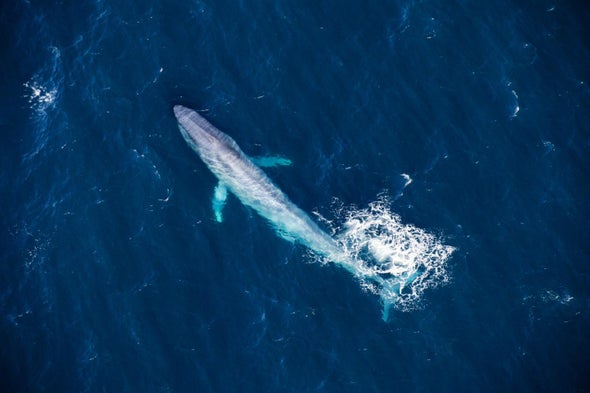(单词翻译:单击)
听力文本
This is Scientific American — 60-Second Science. I'm Christopher Intagliata.
Blue whales are the largest animals ever to exist on Earth. But they're still tough to track. Because they live underwater where we can't easily see them — and often in remote areas, like the southern ocean. But the whales' songs can travel hundreds of kilometers underwater... so scientists often listen for them instead. (blue whale call) By the way, that's sped up 10 times so you can hear it.
Over the years these eavesdropping biologists have noticed a mysterious trend: that certain blue whale calls are gradually lowering in pitch, over time. For example, here's a call from 2002, followed by one from 2017. (2002–2017 call)
"It has been observed in blue whale populations worldwide. So this phenomenon has to have a worldwide explanation." Emmanuelle Leroy is a bioacoustician at the University of New South Wales in Australia. She did the work at the University of Brest in France.
Her team confirmed the phenomenon holds true for populations of blue whales in the southern Indian Ocean, too. And they suggest one reason may be that whale numbers have rebounded from the days of Captain Ahab. More whales means individuals don't have to shout as loud to be heard by other whales. And because of an anatomical peculiarity in the way whales sing, the softer they sing, the lower the pitch.

The scientists have another theory, too, which may be acting in concert with the first: which is that whales are singing more softly—and therefore more deeply—because increasingly acidic ocean waters carry their calls farther. The full write-up is in the Journal of Geophysical Research: Oceans.
Leroy and her team noticed one other short-term trend: that southern blue whales' songs actually get higher in pitch during the Austral summer. Perhaps in an effort to be heard over cracking icebergs.
"Like when you put an ice cube in your drink, you can hear it crack. So it's the same for an iceberg — so it will be really loud and you can hear it across an oceanic basin."
To solve these mysteries more definitively, the scientists say that we'll need to keep listening, and monitor the changing chemical and acoustic properties of the oceans. To see which of these ideas are borne out. And which don't hold water.
Thanks for listening for Scientific American — 60-Second Science. I'm Christopher Intagliata.
参考译文
这里是科学美国人——60秒科学。我是克里斯托弗·因塔利亚塔。
蓝鲸是地球上有史以来存在过的最大动物。但蓝鲸仍然难以被追踪。因为它们生活在水下,我们无法轻易看到其身影,而且它们通常在南大洋等偏远地区活动。不过蓝鲸的歌声可以在水下传播数百公里,因此科学家经常用歌声来代替观察。(蓝鲸的叫声)顺便说一句,这是将蓝鲸叫声放大10倍的效果,所以大家才能听到它们的声音。
多年来,这些偷听的生物学家注意到了一个神秘的趋势:某些蓝鲸叫声的音高正随着时间的推移而逐渐降低。比如,以下分别是2002年和2017年录制的蓝鲸叫声。(2002年和2007年叫声录音)
“我们在世界各地的蓝鲸种群中都观察到了这种现象。因此,这种现象必须要有一个全球性的解释。”澳大利亚新南威尔士大学的生物声学家艾曼纽·勒罗伊说到。她在法国布雷斯特大学进行了这项研究。
她的团队证实,这种现象也存在于南印度洋的蓝鲸种群中。他们认为,其中一个原因可能是,蓝鲸数量已从“亚哈船长”时代开始回升。蓝鲸数量增多,意味着个体不必再像以前那样大声说话才能让其他同伴听到。基于蓝鲸唱歌方式的解剖学特点,它们的歌声越轻柔,音高越低。
科学家还提出了另一种理论,这种理论可能与第一种理论一致:蓝鲸的歌声越来越轻柔,也继而越来越低沉,因为酸性日益增强的海水会将它们的歌声传播得更远。完整研究报告刊登在《地球物理研究:海洋》期刊上。
勒罗伊及其团队注意到了另一个短期趋势:在南半球夏季时,南大洋蓝鲸歌声的音高实际上会上升。也许这是蓝鲸为了盖过冰川碎裂声,让同伴听到自己的声音。
“就像把冰块放进饮料时,你会听到冰块碎裂的声音。冰川也是如此,它在碎裂时会发出巨响,声音大到整个海洋盆地都能听到。”
为了更明确地解答这些谜团,科学家说他们要继续聆听并监测海洋化学和声学特性的变化。看看哪种观点最后得到了证实,哪种观点站不住脚。
谢谢大家收听科学美国人——60秒科学。我是克里斯托弗·因塔利亚塔。
译文为可可英语翻译,未经授权请勿转载!
重点讲解
重点讲解:
1. hold true 同样适用;在…情况下亦然;
This law is known to hold true for galaxies at a distance of at least several billion light years.
据知,这条定律同样适用于距离至少几十亿光年之远的星系。
2. in concert with 合作;同心协力;
He wants to act in concert with other nations.
他想和其他国家采取一致行动。
3. bear out 支持,证实(某人的说法);
Unhappily the facts do not wholly bear out the theory.
令人遗憾的是,这些事实并不能完全证明该理论。
4. hold water (论点或理论)符合逻辑,站得住脚,经得起考验;
This argument simply cannot hold water in Europe.
这个论点在欧洲根本就站不住脚。


